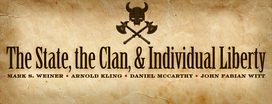I hope that we do not lose one of the insights of Mark’s book, which is that the rule of the clan represents an alternative way to operate law. It is not just “clannishness.”
I may be wrong, but I think of it this way:
Consider two wrongs that John might commit.
1. John works on the Sabbath, violating a custom.
2. John assaults Fred.
Under a clan-based order, these two offenses are similar. From the clan leader’s point of view, both of them bring shame on the entire clan.
Under a modern state, they are different. Whether working on the Sabbath creates legal jeopardy for John depends on (a) whether there is a written law against working on the Sabbath and (b) whether an agent of the state catches John working.
On the other hand, the assault on Fred is something that Fred can press charges and seek redress for. It is not the shame brought on the clan, but the injury done to Fred, that creates legal jeopardy for John. In that sense, the modern state is recognizing that Fred is an individual, with individual rights.
Mark’s claim is that without the state, individual rights are not recognized. I can see that this would be true if without a state the society reverts to a clan-based order. However, I am not convinced that if we were to take the Federal government out of the business of providing income security and extensive economic regulation that the U.S. would revert to a clan-based order.

